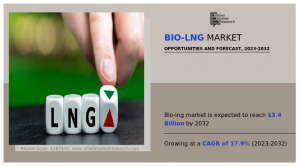Bio-LNG Market Estimation to Hit $3.4 Billion by 2032
Global Bio-Liquefied Natural Gas Market projected to grow at a CAGR of 17.9% from 2023 to 2032
According to a new report published by Allied Market Research, The bio-LNG market1 size was valued at $0.7 billion in 2022, and is estimated to reach $3.4 billion by 2032, growing at a CAGR of 17.9% from 2023 to 2032.
A sustainable and renewable kind of liquefied natural gas (LNG), bio-LNG is produced from biomass sources. As part of the biomass feedstock collection step in the manufacture of bio-LNG, organic resources are first gathered.
Download PDF Brochure: https://www.alliedmarketresearch.com/request-sample/187932
Europe dominated the bio-LNG market and is expected to grow at a high CAGR during the forecast period.
The major players operating in the global bio-LNG industry2 are Linde plc, Nordsol, Flogas Britain Ltd., EnviTec Biogas AG, Biokraft International AB, TotalEnergies SE, Titan LNG, DBG Group B.V., BoxLNG Pvt. Ltd., and Shell Plc.
Policies and programs of the European Union (EU) are also essential in encouraging the usage of bio-LNG among its member states. The use of renewable energy sources like bio-LNG is encouraged by the EU's ambitious climate and energy targets, which are designed to reduce greenhouse gas emissions and promote sustainability and hence contribute to current bio-LNG market trends.
Animal manure, sewage sludge, food waste, and energy crops are among the organic wastes used as biomass feedstock. When biomass feedstock is treated to anaerobic digestion in the absence of oxygen, microorganisms break down organic material.
Methane and carbon dioxide make up the majority of the biogas produced by the process. The resultant biogas is subsequently processed to remove impurities and CO2. It causes a methane concentration increase of more than 90% to equal natural gas quality, depending on the intended usage.
Enquiry Before Buying: https://www.alliedmarketresearch.com/purchase-enquiry/A187448
Bio-LNG can be utilized independently or in conjunction with conventional LNG. It is a more environmentally friendly and cleaner alternative to conventional LNG derived from fossil fuels.
The environmental benefits of bio-LNG include lower greenhouse gas emissions and the encouragement of organic waste management for energy production. As a result, the economy becomes more sustainable and circular.
The biogas is cooled to extremely low temperatures, frequently below -160°C (-256°F), in order to purify the methane present. During the purification process, methane in biogas is refrigerated to extremely low temperatures, frequently below -160°C (-256°F).
Bio-LNG is made by converting a gas into a liquid. Numerous uses of bio-LNG exist, including the production of energy and heating. It's also used to power ships, buses, and other kinds of transportation.
Given that it is made from organic waste products that are continuously produced from numerous sources, bio-LNG is regarded as a renewable energy source. Its consumption and production greatly reduce greenhouse gas emissions, particularly methane emissions from the decomposition of organic waste, making it a more environmentally friendly LNG alternative to traditional LNG derived from fossil fuels.
Get a Customized Research Report: https://www.alliedmarketresearch.com/request-for-customization/A187448
Bio-LNG enhances energy security by providing an alternative and locally sourced energy supply, reducing reliance on fossil fuel imports. It will be an efficient and cost effective solution for several sectors because of its compatibility with existing LNG infrastructure and applications. It can significantly reduce greenhouse gas emissions as compared to conventional LNG made from fossil sources.
Since bio-LNG can be used in existing LNG infrastructure and in natural gas cars, integrating it into the current energy system is made easier.
Securing and maintaining a consistent supply of organic waste feedstock for biogas generation can be difficult in some locations, particularly in places with a weak waste collection and processing infrastructure.
The expense of building the infrastructure needed for the production and delivery of bio-LNG could act as a barrier to entry. The feasibility of the business may be impacted by the fact that creating bio-LNG currently costs more than producing conventional LNG using fossil fuels.
By exploiting economies of scale and improving the productivity of bio-LNG production3, the technology is scaled up and made more affordable.
Buy This Report (235 Pages PDF with Insights, Charts, Tables, and Figures): https://bit.ly/3TboDdF
One of the most prospective applications for bio-LNG is decarbonizing transportation, especially for large, heavy-duty vehicles like trucks, buses, and ships. In order to reduce emissions from the transportation industry, which is a large contributor to greenhouse gas emissions, bio-LNG can be utilized as a sustainable fuel for long-distance travel.
Trending Reports in Energy and Power Industry:
Floating Liquefied Natural Gas (FLNG) Market
https://www.alliedmarketresearch.com/floating-liquefied-natural-gas-market-A15554
Bio-LNG Market
https://www.prnewswire.com/news-releases/bio-lng-market-to-reach-3-4-billion-globally-by-2032-at-17-9-cagr-allied-market-research-301933456.html
LNG Bunkering Market
https://www.alliedmarketresearch.com/lng-bunkering-market
Syngas Market
https://www.alliedmarketresearch.com/syngas-market-A07839
E-Fuel Market
https://www.alliedmarketresearch.com/e-fuel-market-A12837
Floating Production Storage and Offloading (FPSO) Market
https://www.alliedmarketresearch.com/floating-production-storage-and-offloading-market-A07604
Biogas Market
https://www.alliedmarketresearch.com/biogas-market-A08979
Biodiesel Market
https://www.alliedmarketresearch.com/biodiesel-market
Green Hydrogen Market
https://www.alliedmarketresearch.com/green-hydrogen-market-A11310
Second Generation Biofuels Market
https://www.alliedmarketresearch.com/second-generation-biofuels-market
Biogas Plant Market
https://www.alliedmarketresearch.com/biogas-plant-market-A07217
Renewable Fuel Market
https://www.globenewswire.com/news-release/2022/11/29/2564068/0/en/Renewable-Fuel-Market-Is-Expected-to-Generate-2-0-Trillion-by-2031-Allied-Market-Research.html
About Us
Allied Market Research (AMR) is a full-service market research and business-consulting wing of Allied Analytics LLP based in Portland, Oregon. Allied Market Research provides global enterprises as well as medium and small businesses with unmatched quality of "Market Research Reports" and "Business Intelligence Solutions." AMR has a targeted view to provide business insights and consulting to assist its clients to make strategic business decisions and achieve sustainable growth in their respective market domain.
Pawan Kumar, the CEO of Allied Market Research, is leading the organization toward providing high-quality data and insights. We are in professional corporate relations with various companies and this helps us in digging out market data that helps us generate accurate research data tables and confirms utmost accuracy in our market forecasting. Each and every data presented in the reports published by us is extracted through primary interviews with top officials from leading companies of domain concerned. Our secondary data procurement methodology includes deep online and offline research and discussion with knowledgeable professionals and analysts in the industry.
David Correa
Allied Market Research
+1 800-792-5285
email us here
Visit us on social media:
Facebook
X
1 https://www.alliedmarketresearch.com/bio-lng-market-A187448
2 https://www.alliedmarketresearch.com/bio-lng-market-A187448
3 https://www.alliedmarketresearch.com/press-release/bio-lng-market.html

